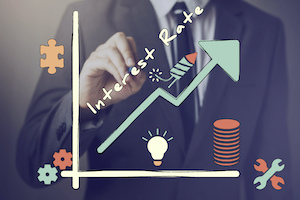Exiting the World of Fiat Currency Into Real Estate & Crypto
The latest issue of the Marsh & Partners monthly newsletter, which anyone interested in real estate, finance, or economics should read - subscribe to our newsletter if you aren't already.
Because of the turbulence in the equity and crypto markets, inflation, and rising interest rates, I thought it was important to discuss how we got here and what it might mean going forward.
I sent this email to my subscribers a couple of days ago. It might not seem like it, but we are extremely optimistic about the future -- as long as you go in eyes wide open.
I hope you enjoy it:
At Marsh & Partners, we talk a lot about real estate. But we also discuss current trends in finance, tech, entrepreneurship, and the macroeconomy, how the whole system is intertwined, and what that all means for real estate.
And we are living through what I believe will be looked back on as one of several seminal economic inflection points in my lifetime.
We've seen a seismic shift over the last couple of weeks in terms of how investors view risk -- and that shift has forced a reallocation of capital across the macroeconomy.
But the pain felt across the economy, especially in equity and crypto markets, is the result of issues long in the making. We simply can't mask the symptoms any longer.
If you're well versed in the school of Austrian economics you know exactly how we got to where we are today.
It's not because of Putin or a virus or supply chain disruptions -- it's a result of our own actions.
Bureaucrats may be at the root of many of our problems, but central bankers are a close second.
So I wanted to spend a couple of minutes unwinding what's happening right now, what it means going forward, and how you might be able to protect yourself.
----------
I don't want to belabor the obvious about inflation, but it's central to what's happening right now.
I've been talking about it for years -- even before it was an allowable topic of discussion.
The Federal Reserve has painted itself into a corner. They're left with a decision to either continue inflating the currency (and it can get much much worse) or driving the economy into a recession -- from which you can expect a period of stagflaton and the collapse of asset bubbles we've been inflating for decades.
Right now, there's political will to rein in inflation, at least until November. But Wall Street is so completely addicted to low interest rates, what happens when the credit markets lock up like they did in March 2020? Will the Federal Reserve have the stomach to continue unwinding its balance sheet or will it again be forced to inject even more liquidity into the market?
It took a fed funds rate of 20%+ to get the inflation of the '70's under control -- our current goal is a rate around 2% by the end of 2022. I don't see a Volcker waiting in the wings here.
The rising rates will have an impact on real estate, but it won't happen uniformly across markets.
We've already seen a precipitous fall in new mortgage and refinance demand with no material impact on home demand in sunbelt markets and high growth cities.
And in many cases, I think there is still some runway for real estate due to the continued shortage of new product delivery to market. Check out our latest video below on how rising interest rates will impact real estate.
But I mention all this to offer some background on what we've seen over the last couple of weeks. The rapid and steep corrections in equity and crypto markets are directly attributable to malinvestment fostered by fiscal policy over the last several decades.
Low interest rates encourage borrowing and result in the misallocation of resources and capital across the economy -- businesses use debt to fund projects they may not have otherwise, speculation is encouraged and in many cases rewarded, and savers are penalized.
Essentially, if you're not taking advantage of artificially low rates, you're being left behind.
And because of this loose fiscal policy, financial institutions and creditors have created a convoluted system of cascading layers of leverage and counterparty risk. Unwinding that debt would be next to impossible without massive fallout.
And why the sharp drop in stock prices? When the spigot gets turned off, a company's future earnings are negatively impacted. And when rates rise, a higher percentage of free cash flow is required to service outstanding debt -- even a 50 bps fed funds rate increase can have a significant impact on interest rate payments.
Additionally, with money so cheap, businesses have historically used excess cash to buy-back shares of stock. This further inflated stock valuations artificially, which makes price corrections even more drastic.
Let's talk about the volatility in the crypto space too.
I'm by no means a Bitcoin maximalist, but if you've followed me for any period of time you know I'm a huge proponent of cryptocurrencies as both a medium of exchange and long-term investment.
But here's the problem and it again comes back to malinvestment.
Not all coins are created equal. And the technology that makes one coin appealing isn't universal across all crytocurrencies. The rise in speculative crypto investments led to fad investing, pump and dump schemes, and hyper-inflated valuations.And now as rates rise, those dollars invested in speculative cryptocurrencies are being reallocated into alternative investments. Without getting into the weeds, if you take one look at the Terra collapse, you'd realize why an algorithmic peg, without a substantial reserve account, is uniquely exposed to speculative pressures.
Historically, Bitcoin has been clobbered during major deleveraging events. It's susceptible to liquidity events as people attempt to shore up other leveraged positions. But those events simply result in rapid short-term volatility and aren't representative of the asset long-term.
----------
But why is all this important to understand? Because the economy is shrinking -- 2022 Q1 GDP was negative and continued inflation and lagging wages will only exacerbate that trend.
And the fiscal policy of the last several decades has lulled many into a false sense of security.
Many prominent economists have argued that the only way this whole house of cards ends is in deflation -- but instead, it really comes down to a political decision. Will central bankers purposely tank the economy or instead continue to print money?
Inflation really hurts the most economically vulnerable -- so don't expect the elite, and the people that hold a majority of the hard assets, to drive us into a deflationary period.
And since an economy based on fiat is the system we're resigned to, it's important to develop an investment strategy that combats the volatility this presents.
The way we evaluate risk going forward will look fundamentally different. There is no such thing as a risk-free asset, but there are ways to manage risk and reduce portfolio volatility.
Most of my investment decisions are made based on several criteria:
- Scarcity
- Is the investment backed by an asset?
- Can I be diluted from my position?
- Can I shore up any leveraged positions with relative ease?
- Can central authorities easily seize the asset?
Build insurance against the worst case scenario. Because the worst case scenario looks more and more realistic every day.
If your investment infrastructure is dependent on someone else's authority or permission, you're not insured. If you can't move money without relying on the solvency of an intermediary or approval from a political institution, you're not insured.
I'll get off my soapbox, but the point is, I don't see a way that we can navigate this to a soft landing.
Reach out if you want to brainstorm and talk about some ways to protect yourself and diversify your portfolio.
It's easy to make money during a bull market... but much harder to make life-changing money.
It's going to be really tumultuous in the near term, but the market dislocation will present some unique opportunities over the next couple of years.
Join me in exiting the fiat dollar system!



